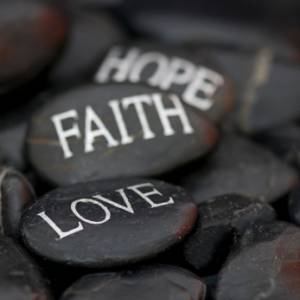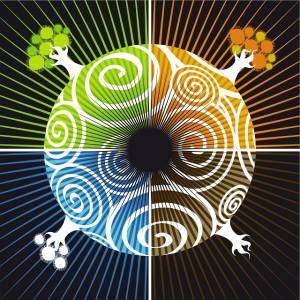Does Mardi Gras Invalidate Lent? Although the Universal Life Church is not a Christian or a Catholic organization, we share many of the same basic beliefs that constitute the foundations of these religions. For instance, our interfaith ministers agree with the Christian message that actions as well as thoughts play a significant part in mortality. Those who knowingly commit acts that they believe are wrong sometimes depend on their religion to offer them ablution simply because they’ve asked for forgiveness after the fact. A great example of this is those who celebrate Mardi Gras in ways that are against the teachings of their religion before repenting during Lent to make up for their transgressions. This can be compared to intentionally living a life outside the boundaries of personal belief systems and asking for redemption on the deathbed.
Although the Universal Life Church is not a Christian or a Catholic organization, we share many of the same basic beliefs that constitute the foundations of these religions. For instance, our interfaith ministers agree with the Christian message that actions as well as thoughts play a significant part in mortality. Those who knowingly commit acts that they believe are wrong sometimes depend on their religion to offer them ablution simply because they’ve asked for forgiveness after the fact. A great example of this is those who celebrate Mardi Gras in ways that are against the teachings of their religion before repenting during Lent to make up for their transgressions. This can be compared to intentionally living a life outside the boundaries of personal belief systems and asking for redemption on the deathbed.
The term Mardi Gras is actually French for Fat Tuesday, which is the last night before Lent when believers can enjoy dining on foods rich in calories, fat and taste. Over the years, revelers have incorporated other behavior into Mardi Gras festivities. Most people who celebrate Mardi Gras consider it to be great fun and often go all-out in their activities, similar to how some people spend Saturday nights engaging in behavior that is considered a sin by their church before appearing at services on Sunday morning.
The interfaith ministers who have become ordained through the Universal Life Church do not necessarily believe that the behavior of Mardi Gras revelers constitutes sin. However, we do feel as if spiritual beliefs should be given more than just lip service. Its a complex issue because even though most people probably consider such behavior to be gaming the system, common interpretations of certain parables in Christianity validate the idea that those who reach spiritual enlightenment late in life are entitled to the same rewards as those who have been pious from an early age. The Biblical Parable of the Workers in the Vineyard portrays a situation in which workers were paid the same whether they had worked for one hour in the vineyard or for an entire day. This parable stresses the belief that God loves all people equally and that does not grant favoritism based on the length of time that a person has been a believer.
Conflicts such as these are excellent opportunities for discussion about spiritual matters. Is it really morally right to use the act of asking for forgiveness after engaging in behavior that is against one’s moral code as a sort of spiritual “get out of jail free” card, and is it possible for a person to abuse the notion of forgiveness so many times that they run out of free passes?
Those who become ordained in the Universal Life Church don’t follow a set of beliefs decided on by others. We believe that every individual, including our interfaith ministers, has to find and follow his or her own spiritual path. Part of the process of developing an individual moral code is exploring questions such as this one thoughtfully and in-depth.
ULC Celebrates World Religion Day
Many religions share goals of strengthening love, hope, and faith both within individuals and amongst a community
Since 1950, the third Sunday of January has been the official day of celebration of World Religion Day. This day of recognition of the commonalities between all world religions was originally started by the National Spiritual Assembly of the Baha’is of the United States. It has also been adopted as a day of celebration by the Universal Life Church since their inception in 1959.
The ULC was founded with the basic doctrine to, “Do only that which is right.” Anyone may become ordained as an interfaith minister by the church free of charge.
This year, World Religion Day will be celebrated on Sunday, January 20th with activities all around the globe. The purpose of the celebration is opening doors of communication between people of all faiths, and even those without expressed faith, to identify common values and goal that promote world harmony.
Celebration of World Religion Day does not require being a member of Baha’is or the ULC. While interfaith ministers will preside over ceremonies in many places, all people are encouraged to participate by doing something that recognizes the fundamental affinity of all world religions. Such activities include:
• Attending the religious services of another faith.
• Initiating a conversation with someone of another faith about the commonalities between religions.
• Attending a celebration of World Religion Day sponsored by the Universal Life Church or Baha’is organizations.
• Personal contemplation of the common goals of all world religions in their aspiration to work as a motivating force for harmony in the world.
The goals of all religions include a desire for peace and an expression of universal love for all humankind. Some may want to become ordained as an interfaith minister in the ULC as a way of assisting others who seek religious recognition or want to perform a wedding, baptism or passing away, but who do not feel comfortable within the structures of more traditional churches and centers of faith.
All religions and faiths have a common core of belief that can become obscured by doctrinal differences and differing rituals and practices. World Religion Day is a moment to recall and celebrate what unites us all beyond and above our diverse ways of expressing our desire for universal love, harmony and peace.
Interfaith Ministers Celebrate Stewardship of Planet
Though created by a Christian church, Earth Sabbath is an interfaith opportunity of people of all faiths to join the conversation on helping the planet
As stewards of this planet that has been provided by the Creator, it is a duty of utmost importance to all those who have become ordained in the Universal Life Church and have taken upon the calling that the Creator has bestowed upon them to lead people from all walks of life in works of faith, healing and love. Never before has it been so apparent that the actions of this generation will have and are already having a profound effect on the sustainability of the Earth and on its precious natural resources that are too often taken for granted. The current changes in the Earth’s weather patterns, the effects of which can be seen daily, speak of the urgency of the Earth’s condition. The theory of climate change can no longer be denied. These changes are rapidly becoming reality, and the time for people of faith to take action is now.
An interfaith holiday with the purpose of bringing spirituality into the environmental issues that are at the forefront of modern society, the “Earth Sabbath” celebration was established by a Raleigh, North Carolina Community United Church of Christ. This celebration is a time for interfaith ministers who have become ordained in the Universal Life Church to reach out to their congregations, friends and neighbors, touching the hearts and minds of people from all walks of life, and offer guidance and direction to those who need to express their grief over the condition of the planet, to express their love for the remarkable home the Creator has provided and to energize people into action. The insight that comes from merging spirituality and environmentalism is necessary to facilitate the changes that are vital to the longevity of the Earth and the resources it provides. People who have embraced their spirituality cannot deny the importance that interfaith organizations must place on the environmental concerns that plague this planet. Spirituality is the very core of environmentalism and love for the planet. The “Earth Sabbath” is a holiday that will allow people of all faiths to come together to harmoniously express their feelings, voice their concerns and bring about action with a peaceful, loving attitude of respect that can only be achieved through acts of faith, love and kindness.
It is vital in these difficult times that people of faith do not fail to head the messages that the Earth is sending about the importance of dealing proactively with the impending and already occurring changes in the climate. For those who are already an interfaith minister or those who feel led to become ordained, it is the time for action and for sharing information and ideas to preserve this planet with those who seek the leadership and guidance of the Universal Life Church.
Younger LDS Members Become Ordained as Missionaries
The LDS Church is allowing younger members to serve as full time missionaries
On Saturday, October 6, 2012, President Thomas Monson, the leader of The Church of Jesus Christ of Latter-Day Saints, also known as the Mormons, announced that effective immediately church policy regarding the age of missionaries had changed. Men can now become ordained missionaries at the age of 18, rather than 19, and women can be 19, rather than 21. Currently, the church has over 58,000 missionaries worldwide, and this surprising move will greatly increase those called upon to serve.
While this age change isn’t mandatory, it does open the door for those of a younger age to receive consideration from local authorities for ordination that wasn’t available to them before. Like the Universal Life Church, the Mormons encourage their members to take an active role in sharing their faith and ministering to others.
Since 1830, when the church was first organized, the Mormons have had a strong presence in Canada. In fact, converts to the church as early as October of 1830 began introducing the church’s teachings to their families and friends in Canadian cities even without being ordained missionaries. During the winter of 1829, Hiram Page and Oliver Cowdery visited Canada while attempting to secure financial backing for the publication of the Book of Mormon: Another Testament of Jesus Christ.
Joseph Smith, Sr. and his son, Don Carlos Smith, were the first official missionaries to preach outside the United States. They were the father and brother of the church’s founder, Joseph Smith, Jr. They arrived in Canada in September of 1830 and visited the villages that lay north of the St. Lawrence River, but Joseph Smith, Jr. also visited and preached in the upper Canadian area with Sidney Rigdon in October of 1833.
Missionary efforts were rewarded, and by 1850, about 2,500 Canada residents had joined the LDS Church. Most of them came from the Ontario area. Although a majority migrated to the United States, in 1887, the current LDS President, John Taylor, sent Charles Card to the northwest territories of Canada. The result was the organization of the Alberta Stake on June 9, 1895, the first stake established outside of the U.S.
Mormon pioneers continued to move into Canada and by 1913, there were so many Mormon Canadian residents that the church began construction of a temple in Cardston. The Cardston temple was dedicated in 1924 and became the first temple to be located outside of the U.S.
Today, the Mormon church has over 182,415 members in Canada, with several belonging to the Universal Life Church as well. This major change will affect those members’ lives in a variety of ways. While the change will prove less disruptive to the educational pursuits of men and encourage more young men to become ordained missionaries, the larger impact comes for women.
Young women will now find themselves on an even footing and given the opportunity to become knowledgeable and stronger in their faith before entering marriage and motherhood. In addition, the stigma attached to unmarried women pursuing an education will dissolve.
 Although the Universal Life Church is not a Christian or a Catholic organization, we share many of the same basic beliefs that constitute the foundations of these religions. For instance, our interfaith ministers agree with the Christian message that actions as well as thoughts play a significant part in mortality. Those who knowingly commit acts that they believe are wrong sometimes depend on their religion to offer them ablution simply because they’ve asked for forgiveness after the fact. A great example of this is those who celebrate Mardi Gras in ways that are against the teachings of their religion before repenting during Lent to make up for their transgressions. This can be compared to intentionally living a life outside the boundaries of personal belief systems and asking for redemption on the deathbed.
Although the Universal Life Church is not a Christian or a Catholic organization, we share many of the same basic beliefs that constitute the foundations of these religions. For instance, our interfaith ministers agree with the Christian message that actions as well as thoughts play a significant part in mortality. Those who knowingly commit acts that they believe are wrong sometimes depend on their religion to offer them ablution simply because they’ve asked for forgiveness after the fact. A great example of this is those who celebrate Mardi Gras in ways that are against the teachings of their religion before repenting during Lent to make up for their transgressions. This can be compared to intentionally living a life outside the boundaries of personal belief systems and asking for redemption on the deathbed.




